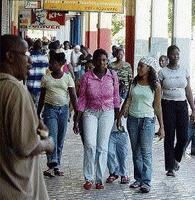Avia Collinder, Sunday Gleaner Writer 
Shoppers in downtown Kingston, the location of many wholesale businesses which, a study says, employ women in substandard working conditions. - File
It is not only in downtown Kingston that women exist under oppressive conditions in wholesale businesses, says Judith.
Formerly employed to a wholesale business on Constant Spring Road at age 17 and just out of high school, this woman tells The Sunday Gleaner conditions there were similar to those described in the recently published study by University of the West Indies master's student Ann-Murray Brown.
In her study, Brown asserts that women employed in wholesale operations in downtown Kingston are being employed in conditions which are in breachof the law. Many of the practices at these business places, Brown found, are in contravention of several national labour and employment laws, as well as international conventions. The study, conducted June to August 2006 and published last month, involved the interviewing of nine women aged 18-25, working in wholesales in downtown Kingston.
"Just imagine being in a building that is filled with boxes and bags of food, no fan, no AC (air-conditioning system), the windows covered by board and only a tiny window at the front to pass goods and money through," Judith recounts.
"Inside the building was dark and very dusty; the roof had cobwebs," she relates. "If I had sinus or asthma, I would have been sick. It was eight to six every day with only Sunday off. The girls had to clean, serve, pack out groceries and cash." She left, she says, when her father "took her away."
No relative to rescue her
For 25-year-old Marva, there was no relative to rescue her when, for an entire year, October 2004 to October 2005, she laboured in a wholesale shop downtown.
Marva had dropped out of a secondary school in Kingston at age 16 when she became pregnant, following the early death of her mother.
"My baby father was not paying me any (attention) and I had to look a work. My mother died in 1996. I have to struggle through life. I left school in grade 10 before taking CXC," she relates.
She had got the job at the wholesale, she said, by walking from shop to shop and asking for work. When they told her that she could come in the following Monday, she was overjoyed. But, her happiness did not last for long. She describes the period as a life of "slavery."
"I took the job because I don't have any skills and we have to survive. No better no deh. It was not nice, trust me,"she states. "We worked from 7 a.m. until 5 p.m. If we get there five minutes past seven, the 'Chinaman' send us back home. If we do it again, he send us home permanently."
The young woman describes the strenuous conditions under which she and five otheryoung girls worked in the wholesale shop.
Recounts Marva: "When we are packing the shelves, we have to climb on to the counter. If one (good) burst, you have to buy it. We had no ladder. We have to take crates, stack them and climb on the counter. Then, when I am on the counter, the other girl pass me the boxes. We had no ladders.
"If we want a tin of Supligen and the boys (men employed to the wholesale) were out, we as women had to lift it and take it to customers, or by the end of the day they fire you. They say, 'You, you can't work, you can't do nothing, you too lazy.'
"They curse and embarrass you in front of crowds: 'You don't have no sense, you so stupid.'"
The wholesale, she says, has a very high turnover, with new faces and others leaving every month.
Someone fired Every week
"Every week, they fire someone. In my time, I was the only one left after a year. They fire them one by one."
She says the Chinese wholesale operators are never short of labour, as the women who come asking for jobs "do not have a skill, so we turn to wholesale work. we have to take the pressure and stay in there."
How did she survive on the $2,400 she earned?
Marva explained: "I throw a partner (informal saving plan) of $1,000 every Saturday and buy baby stuff with $1,000. The $400 left could not carry me back to work, but that is what I did. At the end of the day, it was only partner that could make it seem that I was working for something."
Fortunately, she did not pay rent.
Men working in wholesale shops, she stated, were paid $2,800 - $400 more than women - on the basis that they worked harder. This, she reflects, was unfair and untrue. "They (the Chinese) choose to take goods on a Wednesday when it's half-day downtown," states Marva. "Goods come in by the 50 case, and we could not leave the boys behind to handle them alone. We throw them to each other on a Wednesday. At four o'clock we are just going home. We get no over time pay. If you don't do it, next day, no more job."
Marva left the job, she says, as she needed a caregiver for her daughter and could not pay one. She has learned to survive without the job and she says that even though she is currently unemployed, she would not return. "I would not go back there because they treat us like animal. They treat us very bad," she says emphatically.
names changed.

